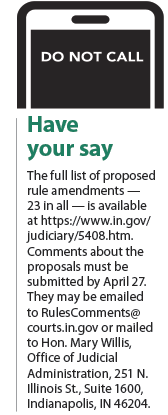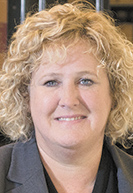Subscriber Benefit
As a subscriber you can listen to articles at work, in the car, or while you work out. Subscribe NowHorror stories abound — armed police stationed outside law firms, protective orders necessitated by angry clients, firm employees learning to shoot a gun, just in case.
The practice of law can be dangerous, especially when attorneys represent parties in emotionally charged cases. But lawyers have long found solace in their homes — havens they say could be violated by a proposed amendment to Indiana criminal and trial rules.
The amendments in question — which would apply to Indiana Criminal Rule 2.1 and Trial Rule 3.1 —would require attorneys to include their cellphone numbers on appearance filings, making their personal contact information publicly available. Lawyers say providing that information could expose them to a deluge of client text messages and phone calls at all hours of the day and night, but Indiana Supreme Court officials say the idea is to improve communication between courts and attorneys.
However, the court also says it has received its own deluge of attorney feedback on the proposals, which has been overwhelmingly negative. Court officials say they are committed to taking the attorney feedback seriously, and lawyers are clinging to that promise in the hopes of avoiding what they see as a violation of their privacy.
Notice vs. nuisance
 Willis
WillisThe proposed amendments to rules 2.1 and 3.1 stem from Indiana’s Pre-Trial Release Project, which uses text notifications to remind defendants about upcoming court hearings, said Indiana Supreme Court Chief Administrative Officer Mary Willis, whose office proposed the amendments. That practice resulted in a 25 percent to 35 percent reduction in failures to appear, which Willis said are often caused by defendants who simply forget when their court dates are.
Further, Willis said dentist and doctor offices frequently send their patients text messages reminding them about appointments. To that end, texting attorneys about their cases seemed like a logical extension of text notifications, she said.
“It’s a common practice used to a successful end to keep people notified,” Willis said.
Attorneys, however, have been crying foul since news of the amendments broke. Indianapolis attorney Rick Mann received notice of the proposed amendments via his subscription to Doxpop notifications, and immediately began spreading the word on a statewide lawyer listserv.
“I’ve done everything from death penalty cases to divorces to speeding tickets, and I’ve had my life threatened,” Mann said. “I recently had someone calling me at the office and leaving threatening messages. So, I thought, ‘What kind of nightmare would it be if they had my cellphone number?’”
What’s the big deal?
 Mann
MannMann’s safety concern is one of several reasons attorneys have opposed the proposed amendments with Willis and the Indiana Supreme Court Rules Committee.
From a personal safety perspective, Indianapolis attorney Robert Shive of Emswiller, Williams, Noland & Clarke, LLC pointed to the possibility of tracing cellphone numbers to attorneys’ addresses, exposing them to unexpected threats at home. For someone like Shive — who has been forced to consider whether a firm employee should be armed — the thought of an angry litigant learning where he lives instantly raises alarms.
Privacy is also a concern for attorneys such as Ryan Groves of Beasley & Gilkison, LLP, Muncie, who doesn’t have a landline at home. That means Groves’ cellphone is his primary form of personal, not business, communication — a separation he’d rather not end by allowing clients to call or text him at all hours of the day and night.
“I think that’ll cause an issue for a lot of people not being able to disconnect,” Groves said. “Being an attorney is a pretty stressful job, so you need to be able to turn everything off — it’s needed for a good work-life balance.”
Even without a publicly available cellphone number, attorneys say they are already accessible 24/7 through email, which is currently how courts primarily communicate with practitioners. Courts and clerks can instantaneously communicate with attorneys through automated email and electronic filing messages, Fort Wayne attorney Dan Bobilya said. Thus, adding text notifications into the communication mix doesn’t seem to create any benefits, he said.
Family law fears
While attorneys from all practice areas have expressed concerns about making their cell numbers public, members of the family law bar have been particularly vocal about their opposition. That’s because the nature of their practices requires practitioners to walk with clients through divorces, custody disputes and parental rights fights — each of which can involve heightened emotions and bitter battles.
“We work in very hostile cases,” said Vanessa Lopez Aguilera of the Lopez Law Office. “Many people are very angry, and they hold you responsible for whatever’s going on in their life. And if you’re successful for your client, the other side is mad at you.”
 Lopez Aguilera
Lopez AguileraThe hostility directed toward Lopez’s family law practice once forced her to seek police protection just to come into the office. She’s also been the recipient of a work-induced protective order, while her paralegal learned to shoot a gun just in case the office received an ill-intended visitor.
In addition to physical threats like those Lopez Aguilera has received, the fast-paced nature of family law has many in the practice area questioning the wisdom of public cellphone numbers. As it is now, Christine Douglas of Harden Jackson Law already gets bombarded with work-related communication via her work phone, email, fax and even social media. And in the moments just before she was set to deliver her first child, Douglas got a call from an opposing party wanting to discuss their case.
The family law attorneys acknowledge that all practice areas are demanding but say the very personal nature of their work makes clients feel as though their attorneys should be available to consult on their family issues at the drop of a hat. With email, family law practitioners can choose to ignore client messages when they’re off the clock but adding cellphones into the mix would greatly reduce that discretion, they said.
“I just know people would take advantage of that,” Douglas said.
Any takers?
Considering these concerns, Willis said lawyer feedback has been predominantly against the OJA’s proposed amendments. The attorneys agreed, with each of them saying that aside from a couple of colleagues who were ambivalent toward the proposals, they have yet to encounter anyone who wants their cell numbers to become public.
There are some situations in which the proposals could work, the attorneys said. Bobilya, for example, noted that attorneys used to have discretion over whether they would accept service by fax. If similar discretion were offered here, then attorneys likely would feel more comfortable with the amendments, he said.
The comment period for the proposed amendments will remain open until April 27, and Willis said the court will seriously consider attorneys’ comments as it decides how to proceed with the amendments. Those comments may result in the proposals being sent to a conference committee with subject-matter expertise for further review, and the amendments could possibly be reposted for public comment if significant changes are made, she said.
Regardless of what form the amendments finally take, Willis said the court is encouraged by the widespread feedback it has received because such feedback allows the rule-making process to work as intended.•
Please enable JavaScript to view this content.
